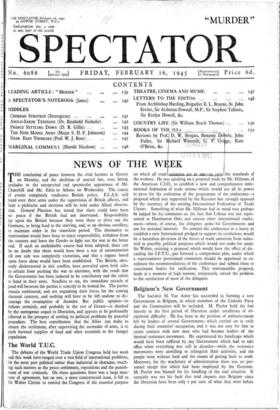The World T.U.C.
The debates of the World Trade Union Congress held last week and this week have ranged over a vast field of international problems, for the most part political rather than industrial in character, touch- ing such matters as the peace settlement, reparations and the punish- ment of war criminals. On these questions there was a large meaz sure of agreement, but on one, a more controversial issue, it fell to Sir Walter Citrine to remind the Congress of the essential purpose
on which all trade e4 the standards of
the workers. He was speaking on a proposal made by Mr. Hillman, of the American C.I.O., to establish a new and comprehensive inter- national federation of trade unions which would use all its power to press for the realisation of the programme of the conference—a proposal which was supported by the Russians but strongly opposed by the secretary of the existing International Federation of Trade Unions. Something of what Mr. Hillman had in mind may perhaps be judged by his comments on the fact that Labour was not repre- sented at Dumbarton Oaks and certain other international confer- ences—where, of course, the delegates spoke for Governments and not for sectional interests. To commit the conference in a hurry to establish a new International pledged to support its resolutions would be a hazardous diversion of the forces of trade unionism from indus- trial to possibly political purposes which would not make for unity. Sir Walter, resisting a proposal which would have the effect of dis- carding the I.F.T.U., put forward a compromise plan, under which a representative provisional committee should be appointed to co- ordinate the recommendations of the conference and submit them to constituent bodies for ratification. This statesmanlike proposal, made at a moment of high tension, temporarily solved the problem to the satisfaction of most of the delegates.


























